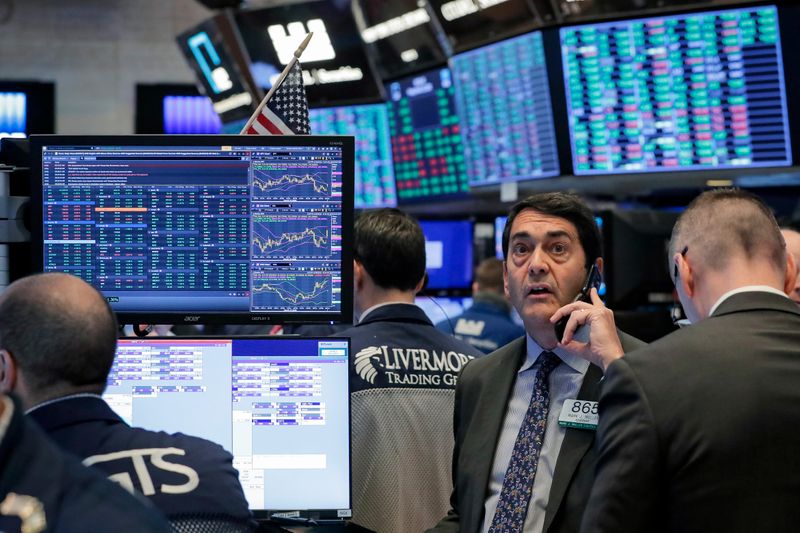By Uday Sampath Kumar and Medha Singh
(Reuters) - Wall Street on Wednesday was unable to sustain strong gains from the previous session as fears about the economic toll of the coronavirus pandemic overshadowed optimism from sweeping fiscal and monetary stimulus to aid businesses and households.
All three main indexes had snapped higher in early trading as Washington reached a deal on a $2 trillion economic rescue package following aggressive liquidity moves by the Federal Reserve earlier this week.
But both set of actions failed to allay concerns the world was sliding into recession. The likelihood of corporate defaults amid a collapse in business activity returned to the forefront on Wednesday, weighing on the S&P 500 (SPX) and tech-heavy Nasdaq (IXIC) in a choppy session.
The Dow (DJI) rose 2.7%, boosted by a 27% gain for Boeing Co (N:BA), as sources said the planemaker planned to restart production of its grounded 737 MAX jet by May.
"There is a lack of fundamental data that we rely on as equity investors to determine what prices should be," said Sean O'Hara, president of Pacer ETFs, a division of Pacer Financial.
"The data that we don't have is what is the impact going to be to GDP, on earnings and how many people are going to wind up losing their job."
Wall Street had staged a furious rally on Tuesday, with the Dow posting its best day since 1933, in wild swings that were last seen at the height of the global financial crisis.
The Senate will vote on the rescue package later on Wednesday and the House of Representatives is expected to follow soon after.
The total figure at stake exceeds the amount the country spends on national defense, scientific research, highway construction and other discretionary programs combined.
"What's remarkable in this particular crisis compared to 2008 is the response by policymakers because the speed with which they've revamped existing programs and introduced new ones is completely unprecedented," said Andrea Cicione, head of strategy at TS Lombard.
At 11:32 a.m. ET the Dow Jones Industrial Average (DJI) was up 554.45 points, or 2.68%, at 21,259.36, the S&P 500 (SPX) was up 21.59 points, or 0.88%, at 2,468.92 and the Nasdaq Composite (IXIC) was up 1.03 points, or 0.01%, at 7,418.89.
Industrial stocks (SPLRCI), led by Boeing, were the biggest boost to the S&P 500, which is still off about $8 trillion in value from its mid February peak.
Nike (N:NKE) gained 12% after beating quarterly revenue estimates and reporting rebounding sales in China.
American Airlines (O:AAL), Royal Caribbean Cruises (N:RCL) and Norwegian Cruise Line Holdings (N:NCLH), among the hardest hit by the coronavirus pandemic, jumped between 15% and 21%.
Advancing issues outnumbered decliners by a 3.01-to-1 ratio on the NYSE and a 1.50-to-1 ratio on the Nasdaq.

The S&P index recorded no new 52-week high and four new lows, while the Nasdaq recorded three new highs and 36 new lows.